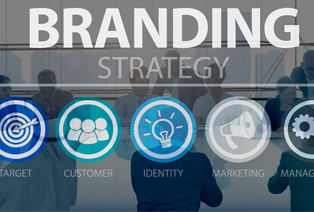Graphic design is the process of visual communication and problem-solving using one or more of typography, photography and illustration. The field is considered a subset of visual communication and communication design, but sometimes the term “graphic design” is used synonymously. Graphic designers create and combine symbols, images and text to form visual representations of ideas and messages. They use typography, visual arts and page layout techniques to create visual compositions. Common uses of graphic design include corporate design (logos and branding), editorial design (magazines, newspapers and books), wayfinding or environmental design, advertising, web design, communication design, product packaging and signage.
Some designers dispute that computers enhance the creative process. Computers allow designers to explore multiple ideas quickly and in more detail than can be achieved by hand-rendering or paste-up. However, some designers find the limitless choices from digital design lead to paralysis or to endless iterations with no clear outcome.
Hand-rendered layouts can be used to get approval for an idea execution before a designer invests time to produce finished visuals. Then the idea is finished on the computer in a hybrid process.
Nearly all of the popular and “industry standard” software programs used for graphic design since the early 1990s are products of Adobe Systems Incorporated. Adobe Photoshop (a raster-based program for photo editing) and Adobe Illustrator (a vector-based program for drawing) are often used in the final stage. Designers often use pre-designed raster images and vector graphics in their work from online design databases. Raster images may be edited in Adobe Photoshop, logos and illustrations in Adobe Illustrator, and the final product assembled in one of the major page layout programs, including Adobe InDesign. Graphic designers are expected to be proficient in these programs.
Choose Echopx Technologies if you need the best Graphic design, we alter according to your requirement to give out the best output.
Branding Strategy
What is meant by branding strategy ?
The branding strategy is a long-term plan to accomplish a number of long-term objectives that ultimately lead to people recognizing and favoring your brand. The brand’s objective, its promises towards its consumers, and how this is communicated are all included in a good branding strategy. A logo, color scheme, and website are important creative components of a successful branding strategy, but they are frequently mistaken for a branding plan. A branding strategy is centered on all the intangible factors that, over time, influence brand equity, brand sentiment, and brand awareness.
Businesses should first identify the business objectives they want to accomplish with the brand launch before developing a brand strategy. In order to increase the brand’s effectiveness, they should also determine the target market. The target population should be identified based on characteristics like age, economic level, location, particular hobbies, occupation, etc.
A strong brand strategy benefits big businesses like Coca-Cola. Customers have stronger brand associations, which influence their purchasing behaviour. All business operations should follow a well-thought-out brand strategy in order to increase financial performance, gain a competitive edge, and enhance customer experience.
Basic components of a brand strategy
Consistency
Consistency entails evaluating each business activity to determine whether it is consistent with the public image being promoted. Customers should be able to recognize the brand because of its consistency and familiarity. For instance, every image and video posted on the business’ social media accounts needs to convey a consistent idea; the audience shouldn’t be confused by any of the messaging. Beyond the brand emblem, consistency extends to important elements like font types, color schemes, images, and linguistic diction. Customers can easily identify a brand thanks to consistency.
Brand Management Purpose
Understanding the organization’s goal is the first step in developing an effective brand strategy. The value which the company aims to deliver to customers should be the main focus, even if most organisations prioritise financial results in their analyses.
Customers often develop a stronger bond with a company that has goals beyond just producing money. For instance, Apple’s mission is to sell more than simply equipment and software; it wants to provide the best best user experience possible. Since it demonstrates Apple’s dedication to delivering additional value further than the sale transaction, this strategy appeals to the company’s current and potential customers.


Employee Participation (brand identity)
Despite being an essential component of the branding process, employees are among the most isolated budding entrepreneurs. Employees should be knowledgeable on how to handle customer communications appropriately because they are the ones that reflect the company’s identity in daily operations.
Employers can maximize their potential by teaching staff members about brand identity. The business can set up training programs and seminars where staff members are instructed on how to effectively use the brand voice on it’s own social media platforms.
Emotion (brand management)
Relationship-building is innately desirable in humans. By establishing a closer connection with its target consumer, a company can appeal to their emotions. For instance, Apple makes use of its consumers’ desire to be social and be a part of a “group” in their branding strategy. Consumers are willing to take a stand in enormous lines and wait days to buy the newest iPhone because Apple exploits emotions to establish lasting relationships with them.


Flexibility (brand marketing)
Marketers need to be adaptable in this rapidly changing world to stay relevant. The upside is that this gives you more creative freedom for your campaigns. While consistency seeks to establish the benchmark for the brand, flexibility allows you to make changes that increase attention and set your strategy apart from that of your rivals.
Loyalty (brand consultancy)
If you already have customers who adore you, your business, and your brand, don’t simply sit there; show your appreciation for their loyalty. These clients have gone above and above to promote your business in their writings, conversations with friends, and other media. More repeat consumers and greater financial gain for your company will result from early loyalty development with these clients.

Types of branding strategy
Branding of Products
One of most common branding strategies is this one. The goal of product branding is to make a particular product stand out and be recognizable. For your customers to quickly recognize your product, symbols or graphics are a crucial component of product branding.
Individual Branding
Instead of branding an entire company, personal branding refers to branding that is utilized for a specific individual. This kind of branding is frequently used to build a person’s reputation, personality, or body of work. This method of branding is frequently used by athletes, politicians, opinion makers, and celebrities to portray the greatest possible image of oneself to the public.
Service Identities
Creating a brand for a service is based on what customers want. When a business uses service branding, they want to give their customers the best service possible. They want to improve their customers’ lives by giving them great customer service.
Corporate Image
Corporate branding is a philosophy that a company develops to present itself with the public and its own employees. It is a core value of business. Every point of interaction a company has with potential consumers, existing customers, and costumers should aim to reflect the firm’s mission, personality, or core values.
Branding online
Online branding, usually referred to as internet branding, aids firms in establishing their presence in the online market. A company’s website, social media accounts, blogs, as well as other online content all fall under this category of branding.
Co-Branding
Co-branding is a technique for branding that links businesses. Co-branding is essentially a marketing alliance among two or more companies. This allows brands to favorably influence one another and may lead to one of them expanding into new areas, strengthening its clientele, and raising brand awareness.
Illustrations of Brand Strategies

AMAZON
Amazon is concerned about the situation and is making every effort to build a solid brand position. The well-known online retailer took good care of the characteristics that set it apart from thousands of others enabled this to stand out of the fierce competition. Customers now favour Amazon because of its quick deliveries and excellent customer service.
Illustrations of Brand Strategies
TESLA
Tesla is a very cutting-edge business with a noble mission. Both sustainability and electric vehicle production are supported. The purpose statement of the company contains information about its mission. It makes mention of initiatives to move the world toward sustainable energy.

Reasons why brand strategy is essential
It raises worker satisfaction (brand marketing)
In addition to communicating the company’s advantages, a great branding strategy also conveys the company’s beliefs and objectives. Employees will readily contribute to accomplishing the company’s aim if they comprehend these two concepts thoroughly. Because businesses are aware of the expectations, this promotes a positive work atmosphere. Additionally, workers are more inclined to remain with such a company that shares their feeling of mission.
It might increase market share (brand management)
An important component of any company is your brand. But brands are typically created in the imaginations of consumers. They are merely a collection of ideas, associations, and sentiments we have with a specific business or item. And in order for a business to become recognizable as a brand in the eyes of consumers, it must first create a strong “mental network” of these associations. This explains why people favor branded products. Your market share will therefore increase as these linkages become more interconnected and powerful.
Building consumer loyalty can be aided by an effective brand strategy (brand identity)
The ability to foster loyalty is one of the amazing benefits of developing a brand strategy. The emotional connection a customer has with a brand ultimately determines which product they choose to purchase over another. Additionally, clients who believe in your brand are much more inclined to remain loyal to you and even recommend you to their friends and relatives. Your clients are less likely to leave you when you establish a brand since it fosters a humanistic connection.
A strong brand strategy can aid in business expansion
Of course, everyone who owns a business wants to see it expand considerably. Making new goods and services is one of the finest methods to do this. But you may also make something you already have appear more valuable. Increasing a product or service’s perceived value is the main goal of brand strategy.You must define your brand as a company owner in a way that alters or broadens the assumptions of your target market. They are much more likely to connect your brand with this. Customers will buy from you more frequently the more they like your brand, which will significantly increase the size of your company.
A corporation can differentiate itself from the competition with a strong brand strategy.
With every passing day, the competition in business continues to heat up. To capture consumers’ attention, brands must compete fiercely with one another. Additionally, consumers may quickly compare the whole of their options thanks to technological advancements. A brand strategy establishes what makes your company’s brand unique and what distinguishes it from its rivals, as was already established. As a result, once you are aware of how you differ from your rivals, you may take advantage of it, especially when promoting your brand.
Key Brand Elements
Brand Character
Brand characteristics show what the company wants people to associate with its brand. Consider the precise personality traits that you want your organisation to be associated with by prospects, clients, workers, and partners. Each of your 4-6 qualities should be a separate phrase.
Brand history
The organization’s history is depicted in the brand story, including how it strengthens and legitimizesh the brand. Additionally, a description of your goods or services is typically included.
Company Promise
The organization’s commitment to consistently delivering on its brand promise to its customers is the most significant one. Think about what clients, staff members, and business partners should anticipate from each engagement with you as you develop your brand promise.
Brand Position
The brand position is the aspect of the brand that explains what your company does and whose, what your distinctive value is and how a consumer benefits from using you and your service, and also what important differentiator you have from the competition. Make your brand stance, once it has been established, accessible in 25, 50 and 100-word forms.
Relative to Brands
The particular tangible items that make up a brand are called brand associations. Your name, logo, colors, taglines, typefaces, pictures, etc. are all contained in here. All of your brand attributes, including your brand promise, must be represented in your brand associations, and they must also complement your brand positioning.
Awareness Objectives
This component of your plan will aid in your efforts to connect with and engage potential clients. To make the most effective use of your marketing budget, you must also take into account the expense and complexity of each marketing endeavour in this phase. Your goals can aid you in spreading the word, along with the intended audience and market research.
Advantages of branding strategy

Display your dedication to your consumers
The promise you make to the company audience, clients, or consumers is your branding strategy. Every time customers use your goods or services, they can anticipate it, and it also keeps you consistent. Knowing the experience you’re offering to your customers will make it simple for you to keep up with their demands and continue to satisfy them.
Focus on the proper business
A brand doesn’t just appear overnight. It’s a mash-up of several elements that work flawlessly together to produce a particular image or evoke particular emotions in individuals who engage with you – and your company. Everything needs to flow together. If your business is a B2B one, the sales cycle comes first. You need to build trust with your clients right away so they know they are getting what they paid for. You want people to think of your company as a reliable one that cares about helping their businesses grow, solve problems, and reach their goals.


Encourage emotional responses from your customers
The most effective branding method you can employ to persuade customers to buy, regardless of whether you’re selling complicated goods or seemingly unimportant services, is playing to the emotions. This is so because people are highly emotional beings who rely on feelings and instincts to make choices or deal with a wide range of situations.
Customers may conduct their own study, read reviews, consult with others who have tried the service or product, and even compile a list of advantages and disadvantages. But ultimately, whether consumers choose your business or one of your rivals will depend on how they think about both brands.
Organize your workforce to increase production
Employees are similar to clients. They are not just looking to set up shop with any company. They seek a business with a compelling narrative or a clear mission. They would like to work for companies that are aware of their mission and purpose so that they, too, can comprehend what they do and why they do it.
While effective branding won’t necessarily solve all of your hiring and firing problems, it will significantly boost morale and teamwork. Your staff members will be more motivated to contribute to achieving those objectives if you can make them feel good regarding your organization and the objectives they’re working towards.


Develop a stronger corporate culture
Being one of those businesses with a high employee turnover rate and few to no applications for its open positions is something you don’t want to do. Job seekers are knowledgeable and prefer to work for organizations with a solid work ethic and a reputation for excellence. Building a strong & good brand with such a positive and healthy workplace culture is necessary to draw in employees and keep them from leaving abruptly. Knowing your purpose or why it matters will help you create a happy workplace.
Create financial value for businesses
Chipotle and Taco Bell, for example, continue to rule their respective marketplaces because they have built strong, enduring brands, much as Samsung and Apple continue to do. When people consider smartphones and Mexican fast food, their names automatically come to mind. When compared to other companies in the same business, they have performed better financially because they have been effective in developing close relationships with customers.


Encourage expansion in your sales and marketing
The world of marketing is not a vacuum. Spending money on advertising without a clear brand strategy or narrative to follow will frequently result in a huge loss of time and money, with little to show for that too.
On the other hand, if you have a clearly defined brand strategy, you’ll be able to confront your marketing with focus and purpose in order to achieve your primary brand goals. The promise you are making to your clients or audience and the best way to fulfil that promise will both be clarified by your strategy.
Photography
About photography
Photography is the art of creating still or moving pictures by recording light or other electromagnetic radiation, either chemically by means of a light-sensitive material such as film, or electronically by means of an image sensor. Light falling on a light-sensitive surface, often photographic film or an electronic image sensor like a CCD or CMOS chip, produces an image that is then captured as a photograph.
There are many different techniques and styles in photography, and photographers may specialize in a particular type or use a variety of techniques. Some common types of photography include portrait, landscape, architectural, fashion, editorial, and wedding photography.

Photographers may use a variety of equipment, such as cameras, lenses, lighting, and other accessories, to capture images. Digital photography has become increasingly popular in recent years, and many photographers now use digital cameras and editing software to create and manipulate images.
To become a photographer, you will typically need to have a passion for photography and an eye for composition and detail. You may also need to have some technical knowledge and skills, such as an understanding of lighting and the ability to use a camera and editing software. Some photographers may choose to attend a college or university program in photography, while others may prefer to learn through experience and self-study.
Images

Image selling is the process of selling stock images or photographs online. This could include selling images to businesses, websites, magazines, or other types of publishers. People can also sell their own images for a fee, or offer them for free under a Creative Commons license. This is an increasingly popular way to make money online, and there are many stock image websites where photographers can list their images for sale.
Commercial usage of the images necessitates the acquisition of releases from the participants and the property owners. Additionally, they must be sold under licenses that permit commercial usage, which typically translates to higher profits for the photographer.
Videos
Video selling is a sales technique that uses video as a medium to introduce potential customers to products and services. Video selling can be used to increase brand awareness, explain product features, demonstrate product uses, and generate leads and sales. By leveraging video, businesses can more effectively target and engage potential customers, resulting in increased sales and customer loyalty.
Video selling is a method of marketing products and services using videos. It is an effective way to capture the attention of potential customers and increase sales. Videos can be used to showcase products, explain services, and demonstrate how a product or service works. Videos can also be used to demonstrate customer testimonials and case studies. Videos are often used in social media campaigns to reach a wide audience and to create an emotional connection with potential customers. Video selling can be a powerful tool for businesses to increase sales and build relationships with customers.

Video selling is the process of using video content to promote and sell products and services. This can include creating promotional videos, product tutorials, customer testimonials, and behind-the-scenes videos to create an engaging and informative message for a product or service. This type of content is becoming increasingly popular for businesses because it allows them to showcase their products and services in a more visual and engaging way. It also allows businesses to reach a wider audience and build trust with potential customers by highlighting their products and services in an entertaining and informative way.
FAQ’S
The link between a business and its customers is solidified by branding. There are competing concepts, goods, and services in every market and category. Without a distinctive brand, a company will become lost among its rivals competing for customers’ attention.
Teams should create a strong foundation with well defined principles and goals since developing a brand is a lengthy process.
Although creating a distinctive brand might take years, if your business is ready to get started, it can be an exciting experience for your entire squad. The branding process at United Landmark Associates starts at least six weeks in advance and keeps changing to meet your needs.
A solid brand gradually establishes itself and represents your message and advantages for you. Even once you have a strong customer base, your brand serves as your representative, luring both potential new consumers and attracting and comforting existing ones.
A strong brand typically contributes to increased profitability and marketing effectiveness, demonstrating that a strong brand is just as valuable as any financial asset.
- Digital Marketing Services
- Brand Consultancy
- Website Design Services
- Web Hosting & Domain Registration in India
- Dynamic Website Development
- Website Redesign Service
- Website Maintenance Service
- AMC & IT Support
- Ecommerce Website Design Services
- SSL Certificate (HTTPS)
- Content Writing
- Complete Email Service
- G Suite Services
- Microsoft Office 365 Email Services
- Zoho Email Services
- ERP Bangalore
- Custom Web Application Development
- Mobile App Development and Services
- Android Application Development
- iOS Application Development
- Windows Application Development







































